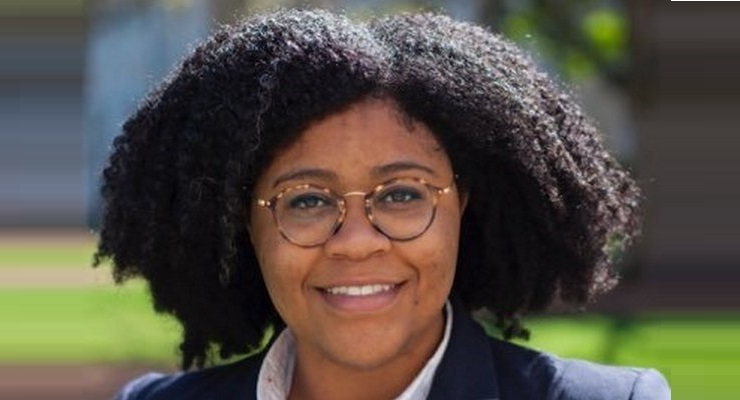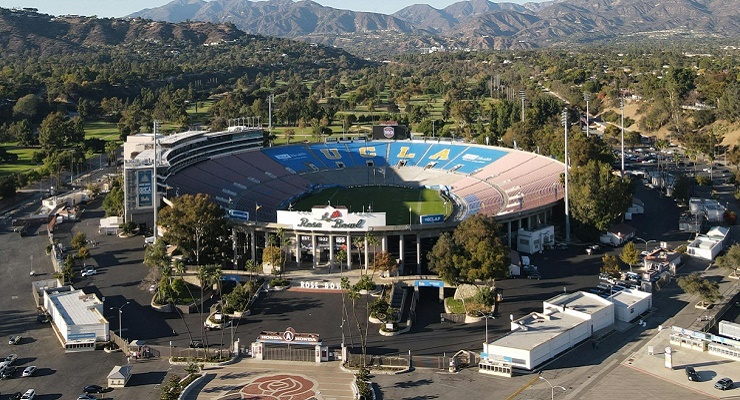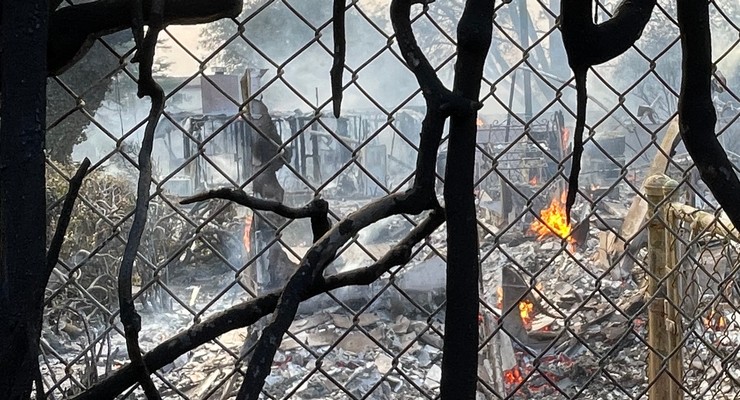
“The seeds of a movement more than 30 years in the making may finally be bearing fruit in the Democratic Party,” Dr. Danielle L. Wiggins wrote in the Washington Post in the run up to the 2018 midterm elections.
Wiggins, an assistant professor of history at Caltech, was talking about the rise of Black political power. Her dissertation, subsequent research and forthcoming book examine Black politics in cities such as Atlanta and Los Angeles and in the Democratic Party in the post-Civil Rights Movement era. She presented her findings at a virtual event on Thursday, hosted by the Pasadena Sister Cities Committee’s Dakar-Plateau Subcommittee. Dakar-Plateau, Senegal, is Pasadena’s first Sister City on the African continent.
An ‘era of limits’
“The 1970s and 80s were a paradoxical period, coming in the aftermath of civil rights legislation like the Civil Rights Act of 1964 and the Voting Rights Act of 1965 and policies like affirmative action and integration,” Wiggins said in an interview with Pasadena Now. “We saw Black people become more integrated into the political, economic and cultural mainstream and we saw the development of Black political power.”
At the beginning of the post-civil rights era, there was a lot of hopefulness and anticipation about the ways in which African Americans would advance in society now that the constraints of segregation had been lifted. However, Wiggins pointed out that Black people entering the political realm had instead experienced a lot of difficulties.
“If we think back to what it was like in the 70s, it was marked by inflation, stagflation, diminishing economic growth, rising unemployment, and then in cities they had to deal with capital flight and white flight out of the cities and into the suburbs,” Wiggins said. “Funding to cities and to civil rights and social welfare programs was also being cut in the 70s and 80s. My research is trying to figure out how they encountered the many crises that African American communities faced in this era of retrenchment. I describe it as an era of limits.”
Policies that civil rights activists had advocated for in the 60s seemed possible during the Civil Rights Movement, such as a federal jobs guarantee and a basic minimum income, but in fact became less feasible in this new era of limits.
“My project looks at how they dealt with three crises in particular: crime, which obviously accompanied economic decline; family politics, this idea of the breakdown and instability of the Black family; and finally unemployment,” she said. “I show that Black political leaders had to navigate between often competing interests at the urban level. They responded to these crises by demanding Black excellence from Black people. They called for Black families to improve by staying together, for Black fathers in particular to be more responsible, for stronger Black communities more capable of policing their own communities and reinstating older mechanisms of community policing and social control.”
Wiggins argued that responding to these crises of the 70s and 80s in this way ultimately informed Black Democratic politics as it is known today. She pointed out that a lot of the same rhetoric, such as demanding “Black excellence,” is espoused from figures such as former President Barack Obama and Vice President Kamala Harris as well as many of the Black mayors who are in office today in cities across the country.
Blue state Georgia
Atlanta, Georgia, in particular turned out to be a fortuitous location to focus her research. The historically dark red, deep South state played a major role in catapulting Democrats back to power in the House of Representatives in the 2018 midterms and in the White House and Senate in the 2020 election, largely due to the rise of Black voting power in and around Atlanta spearheaded by Stacey Abrams, after decades of those in power telling Black people that the only appropriate protest that they can express is at the ballot box. The relevance of that connection to Wiggins’ research, which she began before these trends, was just a coincidence, she said.
“There’s a lot going on in Georgia and Black Democratic politics there,” she said. “Just over the past year, I have had to rethink my conclusions and the end of the project.”
She has pointed out that contrary to popular belief, Black voters historically were not a monolithic bloc that always reliably voted Democratic. She wrote in the Washington Post that in reality, during the 20th century, African Americans “were anything but blindly loyal partisans.
They have indeed migrated from the Republican Party to the Democratic Party, but they did so gradually and unevenly, based on clear-eyed calculations of which candidate represented the best hope of advancing equality in American society. They didn’t become Democrats out of misbegotten loyalty. Instead, Republicans left them little choice, moving sharply to undermine the gains of the Civil Rights Movement.”
She added that “until the Republican Party ceases its rhetorical and legislative assaults on the poor and people of color and asserts itself as the party of civil rights once again, Black voters will continue to rebuke the party of Lincoln.”
Wiggins also looks at the roots of the Black Lives Matter movement in her dissertation and her upcoming book, which she argues was prompted in part by Black political leaders expanding police power in Black neighborhoods. At the time, in the 1970s, crime rates were among the highest that they’d ever been.
“There were Black community members and Black activists who were calling on their political leaders to do something about the crime problem,” Wiggins said. “They would use that phrase: ‘Do something.’ They not only wanted more police, they wanted these leaders to address the roots of crime, which were poverty and unemployment and a lack of opportunity. But because of what the Black urban political leaders had available to them because of the shifting political and economic landscape of 1970s and 80s America, they were only able to get lots of funding from the federal government to expand the size of the police force and police power.”
Wiggins described the “intensification” of policing in Black neighborhoods—on top of an already intense situation—by Black mayors such as Maynard Jackson in Atlanta, Tom Bradley in LA and Coleman Young in Detroit. She argued that BLM emerged during Obama’s presidency as a rejection of that particular way of dealing with the crime problem.
“BLM has been calling for these Black political leaders to address not just the roots of crime but a broader range of social problems and to stop using expanded police power to address these deeper social issues that are very much about economics and lack of income and lack of opportunity,” she said.
Pleasantly surprised
Wiggins said she was surprised to find herself teaching at a place like Caltech, an institute that focuses on science, engineering and technology, considering she’s a historian. Pleasantly surprised, as it turned out.
“I thought I would be at a traditional history department at a liberal arts college, but there’s a lot I love about being at Caltech,” she said. “First and foremost, the students. They’re the best students I’ve ever encountered. Not only are they brilliant scientists and engineers, they’re also just brilliant thinkers broadly. They work really, really hard. They actually commit to doing the work even when my class probably isn’t their top priority. They still do the work, and it amazes me every time.”
She said that her training as a historian gives her a particular perspective and approach to her work, which is entirely different to that of Caltech students.
“I get into these habits of thinking like a historian, where they don’t think like historians, so they ask different sorts of questions and use different metaphors for explaining historical processes,” she said. “It forced me to evaluate historical material in ways that I just wouldn’t because of my own disciplinary training. It has helped me to approach history and my own research as well as my teaching in a new way that has been really beneficial and wouldn’t have happened in quite the same way if I had gone to another type of institution.”
Previously, Wiggins worked as an editorial assistant with the Washington Post’s “Made by History” blog, which gives historians a platform to present current events in historical context to a diverse and wide-ranging audience. She also served as a teaching assistant and editor of the Georgia Civil Rights Cold Cases Project, in which Emory University undergraduate students examine unsolved and unpunished racially motivated murders from the civil rights era. She spent a year as a visiting fellow at the University of Virginia’s Jefferson Scholars Foundation. Her work has been featured in the Post, the Journal of Urban History, the Journal of African American History, and Atlanta Studies. She earned her Ph.D. in history from Emory University in 2018, specializing in African American political history and urban political economy.
She added that she also truly appreciates the high priority Caltech places on in-depth research, particularly for the humanities.
“They give you the resources to do good work,” she said. “I don’t know if there’s a better place for a humanist to be.”
In an interview with Caltech’s communications shop, Wiggins said Caltech’s “small size provides a lot of room for autonomy and creativity. I’m able to teach all of my dream classes.”
She added that “students have a sense of the Voting Rights Act in 1965, and then they don’t really know what happens between then and Barack Obama and the Movement for Black Lives. [My] class is about filling in those gaps. What happened in the post-civil rights era to produce both the election of a Black man to the highest office in the land, but at the same time, what happened to necessitate the Black Lives Matter movement?”
Bridging the cultural gap
The Pasadena Sister Cities Committee’s Dakar-Plateau Subcommittee had a number of in-person events and cultural exchanges in mind before the COVID-19 pandemic intervened. To help bridge that gap, they’ve launched a virtual speaker series as a way to educate the public and keep that relationship connected, said Boualem Bousseloub, chair of the subcommittee.
The idea of partnering cities grew out of the Twin Town concept in Europe in 1946 following World War II. Ludwigshafen was selected in 1948 by the Pasadena branch of the American Friends Service Committee. America’s involvement came in 1956 following President Dwight Eisenhower’s White House conference on citizen diplomacy, out of which grew Sister Cities International (SCI). Pasadena formally established its Sister Cities chapter in 1960.
Pasadena has six Sister Cities partnerships, with Ludwigshafen, Germany (1948); Mishima, Japan (1957); Järvenpää, Finland (1983); Vanadzor, Armenia (1991); the Xicheng District of Beijing, China (1999); and Dakar-Plateau, Senegal, which was approved by the Pasadena City Council in 2018 after many years of discussion, planning, and research, including an exploratory delegation to the West African city led by Bousseloub and Councilmember John Kennedy. Following approval by both cities, Dakar-Plateau Mayor Alioune Ndoye led a delegation to Pasadena in June 2019 and Pasadena Mayor Terry Tornek led a delegation to Dakar-Plateau in March 2020 to finalize the partnership.
Dakar-Plateau has a population of nearly 37,000 people and is one of 19 districts of Senegal’s capital of greater Dakar, serving as its political, financial and commercial center. Dakar is the westernmost city on Africa’s mainland, with a population of 1 million.



















